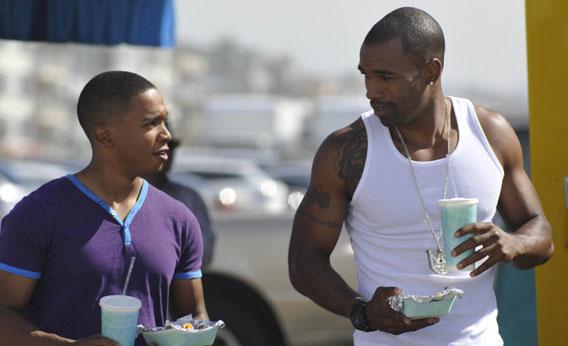The L.A. Complex, which you should watch before the end of its tragically short run on the CW (Tuesdays at 9 ET), is a quirky Canadian spin on a standard Hollywood story: ambitious new arrivals on their way up cross paths with once-hot starlets on their way down. The usual plots—the big break that doesn’t quite go as planned, the ingénue who wins the heart of the grizzled veteran—have been tweaked just enough that they’re recognizable without being predictable. It’s like Toronto as seen by a U.S. tourist: Everything is vaguely familiar, but for some reason the road signs are in kilometers, and the queen is on the money.
The six young wannabes at the show’s center—Connor, a handsome Australian whose pilot just got picked up; Abby, an actress from Toronto; Alicia, a blonde dancer with no inhibitions; Nick, a comedian with a big heart and very little talent; Tariq, a musician from Montreal, and Raquel, whose glory days as the star of Teenage Wasteland are long behind her—all hang out at the Deluxe Suites, a seedy but social home base. As in Melrose Place, from which the show has borrowed plot lines and pool furniture, the cast spends a good chunk of time fraternizing poolside, but beyond the bikinis and red Solo cups, The L.A. Complex is shot through with loneliness. None of the young strivers has any family support, partly because it’s an immigration story—they’ve left their loved ones back in the homeland—and partly because the show recognizes the essential selfishness of show business: Only one person can book each role. It’s no coincidence that the show’s most successful characters, newly-minted leading man Connor and millionaire rapper Kaldrick, are the most miserable, isolated and lonely inside their sprawling mansions and fancy cars.
Like two other shows from this season, NBC’s Smash and HBO’s Girls, The L.A. Complex is about the complicated business of ambition: how far people will go to achieve their dreams, and how those sacrifices warp their souls. Making it in Hollywood takes a combination of hard work—hustling for every audition, taking a million meetings, working out like a fiend—and persistence. Success is an endurance test, and whoever sticks it out in L.A. the longest has the best chance of winning. Not that staying guarantees success. As a disenchanted Abby tells Alicia in the season premiere, “Even if I get in the right room with the right people with the right outfit, what are the odds? I still have to be the funniest, the hottest, or the most talented … whatever crazy specific thing they want that day. You can give everything you have here, and it still might not be enough.”
Of course, when all that doesn’t work, there’s always opportunism. Raquel hasn’t booked a job in two years, but perhaps she can pull off the performance of a lifetime to interest the rich dentist she met at an AA meeting in her latest film project. (She’s not really sober, but the meetings are a great place to network.)
To use a word that has been overapplied to Girls, there’s a realness to The L.A. Complex that is almost shocking. Sure, the Angelenos are all beautiful and buff, but the rules of the real world still apply. (We see them working for those toned torsos, after all.) When Abby’s car—which was also, effectively, her home—breaks down, her friends can’t leave their day jobs to come to her rescue, and since she has no money for a cab, she becomes the first person in TV history to ride a city bus to an audition. The show’s big love story, and certainly its most passionate, is between Tariq and Kaldrick, and unlike so many of the sexless gay relationships on TV, their love scenes are just as explicit as the straight couples’. (Not terribly explicit, that is, but at least the censorship is consistent.) And the kids of The L.A. Complex are just as dumb and messy as real twentysomethings: After Ecstasy-gobbling Abby and boozed-up Connor have unprotected sex, Abby dutifully takes the morning-after pill … and an hour later finds herself puking into the piano at an important audition.
The show tackles serious issues by not taking itself terribly seriously. It wrestles with race by showing well-meaning white people floundering as they try to avoid offense. No one knows how to categorize Abby’s ethnicity (actress Cassie Steele is half-Caucasian, half-Filipino), so one character after another squirms as they tentatively suggest “Spanish … Asian”? When Eddie, the manager of the apartment building, meets Kaldrick, he excitedly launches into one of the rapper’s famous lines, “Ain’t no bigger six-figure trigger …” before self-consciously humming through the final rhyme. (“I didn’t say the word!” he insists when Kaldrick storms off.) And when Raquel is told that the producer has decided to cast a black woman in the role she’s come in to audition for, because an all-white show “doesn’t really reflect reality,” she exasperatedly asks the assembled black actresses, “Do any of you have a white best friend? No, right? It’s a TV-only thing.”
Given the show’s ratings, which have been spectacular only in their badness—EW.com declared the premiere “the lowest-rated in-season broadcast drama debut on record”— after the last of the initial six episodes airs next Tuesday, there’s no way the CW will exercise its option for the next 13, which will be broadcast in Canada starting in July. It’s a minor tragedy for fans of sexy, sunny drama—The L.A. Complex launched, with little fanfare, at the tail end of the broadcast season, when viewing habits were already well-established. If the CW had waited until the slow summer weeks, it would surely have had a better chance. When Raquel tells anyone who asks that Teenage Wasteland got canceled because “we had a bad time slot,” she’s massaging the facts. But for the funny, fearless show Raquel’s a part of, it’s the sad truth.
